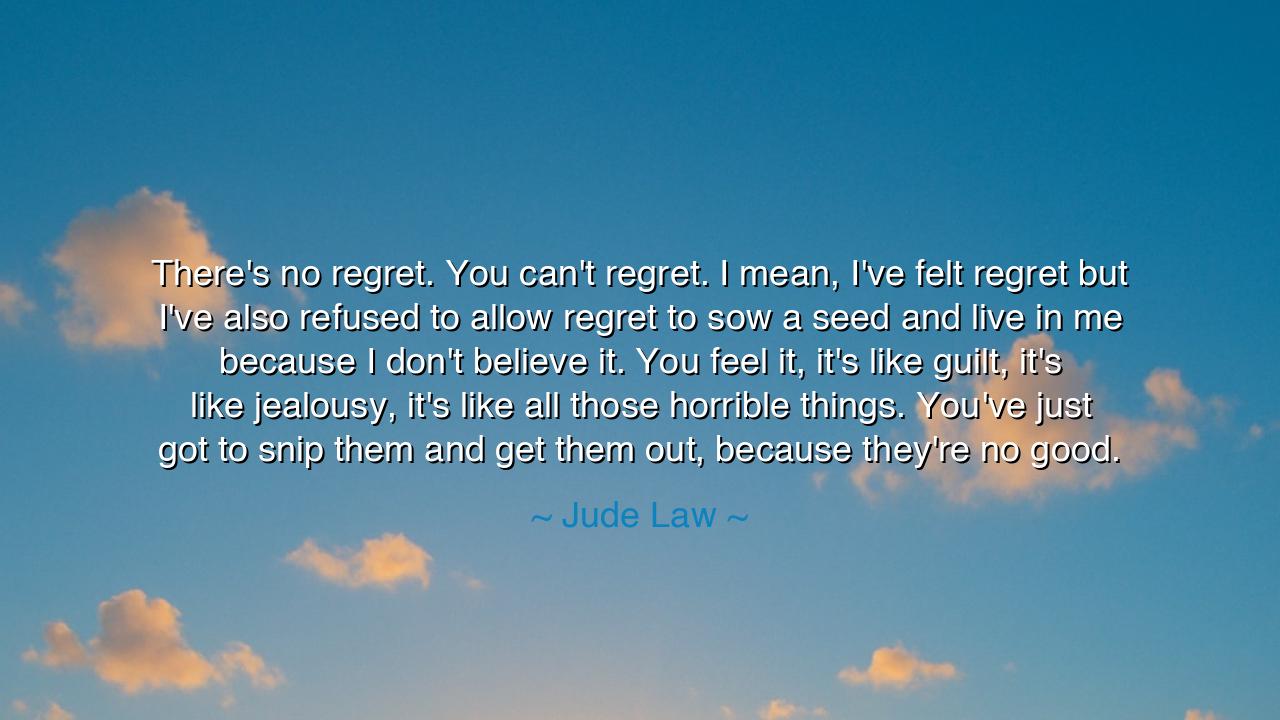
There's no regret. You can't regret. I mean, I've felt regret but
There's no regret. You can't regret. I mean, I've felt regret but I've also refused to allow regret to sow a seed and live in me because I don't believe it. You feel it, it's like guilt, it's like jealousy, it's like all those horrible things. You've just got to snip them and get them out, because they're no good.






“There’s no regret. You can’t regret. I mean, I’ve felt regret but I’ve also refused to allow regret to sow a seed and live in me because I don’t believe it. You feel it, it’s like guilt, it’s like jealousy, it’s like all those horrible things. You’ve just got to snip them and get them out, because they’re no good.” – Jude Law
Listen, O traveler upon the road of time, to this voice of hard-won wisdom. The actor Jude Law, though born of the modern age, speaks here with the heart of an ancient philosopher. His words carry the weight of one who has walked through the labyrinth of regret, felt its thorns press deep into the soul, and yet refused to let them take root. In this saying, he teaches that regret, like guilt and jealousy, is a shadow that feeds upon the light of life. It comes, yes—because we are human and flawed—but it must not be allowed to stay. For the wise do not let sorrow rot into bitterness; they snip it out, as one would remove a weed that threatens the harvest of the heart.
Regret is a serpent that whispers, “If only.” It coils itself around the past, tightening until one cannot breathe in the present. Yet what power does the past have, except that which we give it? The ancients knew this truth well. Epictetus, the Stoic sage, taught that we should concern ourselves only with what lies within our control. The past, once lived, is beyond all reach. To cling to it is to wrestle with the wind. Therefore, the wise let go—not from indifference, but from strength. They acknowledge pain, learn from it, and then cast it aside like a spent arrow.
Consider King David, who in his youth was radiant with promise but later fell into grievous sin. When he realized the depth of his transgression, he was crushed by regret—his songs turned to lamentation, his heart to ashes. Yet when he rose from his grief, he did not let regret devour him. He learned humility, he sought forgiveness, and he began anew. In his later psalms, we see a man who has suffered, yes, but who has not let suffering become his master. He knew what Jude Law would echo thousands of years later: that regret, if allowed to dwell within, becomes corruption—but if faced and released, it becomes wisdom.
Regret, like guilt and jealousy, springs from the same poisoned root: the refusal to accept what is. The jealous heart cannot bear the success of another; the guilty heart cannot forgive itself; the regretful heart cannot forgive the past. Each lives in resistance to truth, and thus each suffers. The magnanimous soul, however, accepts the turning of life as it is—its triumphs and its failures, its joys and its wounds. They know that every mistake is a teacher, every fall a step in the climb toward understanding. Such a person does not deny the sting of regret; they simply refuse to water it.
There is strength in what Law calls “snipping it out.” This is not the cold denial of emotion but the courageous discipline of the spirit. When sorrow arises, feel it. When guilt visits, listen—but only long enough to learn what it teaches. Then cut it away before it festers. For emotions are guests, not masters; they come to remind us of our humanity, not to enslave it. The wise soul feels deeply, but lives freely.
Think of Nelson Mandela, who spent twenty-seven years in prison, robbed of youth and freedom. When he walked free, he had every reason for regret, every right to dwell upon lost time. Yet he said, “As I walked out the door toward my freedom, I knew that if I didn’t leave my bitterness and hatred behind, I’d still be in prison.” Such is the essence of Jude Law’s teaching: the refusal to let the darkness of the past steal the light of the present. The past cannot be undone, but it can be redeemed—if we do not let regret live in us.
So, O listener, when regret stirs in your heart, meet it not with despair but with awareness. Ask what it would teach you, and then bid it farewell. Do not let it dwell and grow roots, for it will choke the life within you. Instead, turn its ashes into fuel—let every mistake make you wiser, every wound make you more compassionate. Live as one who accepts the whole of their journey, both shadow and light.
And remember always this truth: regret is a feeling, not a fate. You are not bound to it unless you choose to be. So be swift to forgive, both others and yourself. Be gentle in reflection, but fierce in forward motion. For life is too brief, and the spirit too sacred, to be spent mourning what cannot be changed. Snip out regret, and plant instead the seed of wisdom—and watch how it blooms into peace.






AAdministratorAdministrator
Welcome, honored guests. Please leave a comment, we will respond soon